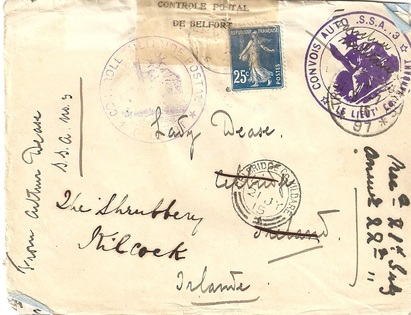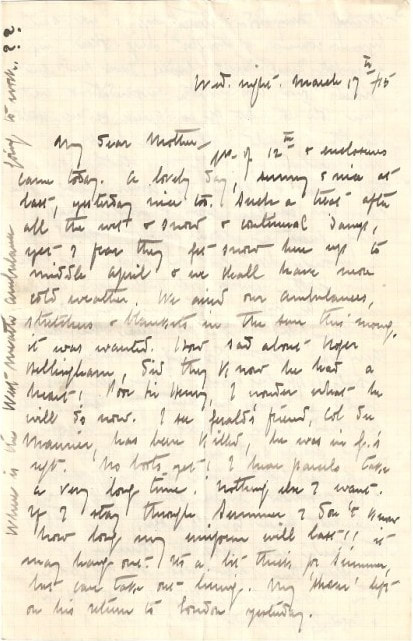These Edwardian letters and Great War (la Grande Guerre) letters home are a personal first-hand history of the late 19th and early 20th century from an extraordinary perspective. Take a fresh look at the Edwardian Era and WW1 - It was much more than mud and trenches. The unique perspective of these letters adds to the historical context of WW1 humanising a part of history often lost in statistics and emotion. Arthur Dease has an important story to tell, these first world war letters are an excellent eyewitness history of WW1 and the Edwardian period. World War 1 Letters home from the front lines, letters from behind the lines, letters from the trenches and letters from the home front in London. There is plenty of talk of mud and trenches, gas attacks (experienced first hand by Arthur), home front and society gossip. Most importantly Arthur's letters are an Edwardian and World War One human interest chronicle written by an intelligent and articulate observer from a very different perspective, not a tedious conventional military history. These letters are social history at its best. These primary source Great War letters from the frontlines and Edwardian era letters home are an almost unique view of late Victorian and the early 20th-century world. Arthur writes about the First World War, the people, social and political events of the day as they unfolded, and of course, the battles, trench warfare and horrors he witnessed first hand. These letters are Arthur's eyewitness account of the late 19th and early 20th centuries and WW1 and the rapidly changing times and culture he lived in; an excellent social history. There is no political correctness, just a good first-person observation of a vanished society. Each generation sees the war from a different perspective; history is always reinterpreted, but Arthurs Edwardian era and WW1 letters home tell the story of the moment. Arthur also travelled around the world and sent a large number of letters home during the period 1892-1920. I have also published some of those from the USA, South America, and Australia. I try to add new items regularly. These letters also show a fascinating glimpse into the privileged world of an Edwardian gentleman and a picture of the lost pre-WW1 world. Text I have added for the sake of clarity is enclosed in [ ] brackets. Some of the words, place names or people names can be difficult to read and I replace those with "??????", but again I will revisit these letters and amend where possible. Next Page - Family Background |
Some extracts from Arthur's Great War and Edwardian era letters home:Several of us have had shells pretty close lately, they shell the road we use to try & stop the staff & ammunition going down to the troops & also searching for batteries in hills around. Russians seem in not a very good way at moment & Warsaw in balance! Nothing seems ever to happen in Flanders & I don’t suppose we shall ever advance in those parts. How sick everyone must be of it all, Germans included ... July 24th 1915 Australia - We were 2 nights with the Jim Finlays & motored round my old place which I showed them & down to see the farmer who bought it, they were much surprised to see a motor turn up, none had ever been round these parts before. The wife, an old German, was too frightened to come near it, but talked to the ladies from a safe distance. There is soldiering & soldiering, doing it comfortably at home strutting about in Kaki [sic] in safety & this sort of thing where one has no rank, no pay, bombed & bombarded not to say gassed & living in the woods, caves or cellars. If Allies ever do really win it looks pretty blue for Kaiser, Crown Prince & all leading Generals & people who sanction these things, surely they can never escape hanging. 2nd August, 1916 We should never forget the WW1 fallen, but should also remember those lucky enough to return home, many of whom bore the physical and mental scars for the rest of their lives...
There are site search boxes on each page, a Site Map, and I have added an index for each year 1915, 1916, 1917, 1918 and pre WW1 this gives a month by letter summary for ease of research.
Of course, we all know that The Great War, la Grande Guerre, ended in November 1918, try to read these letters without the benefit of hindsight, Arthur's letters tell the story of the moment, the human touch behind history.
These bundles of letters are no longer forgotten dusty relics but have become a living and breathing testimony of life 100 years or so ago, social history brought to life. When transcribing these letters I leave the grammar etc. as it was written. I also omit the more mundane sentences or paragraphs, replacing these with "...", however I will revisit all of the letters in time.
|

